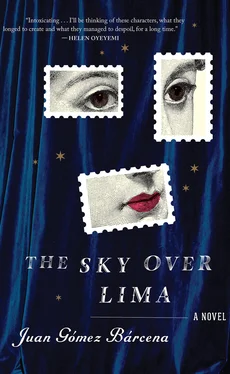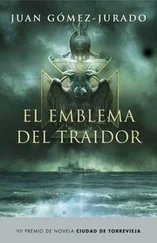The poetry problem, however, is never solved. They send the boy off on endless walks, but he always manages to slip a volume of Hölderlin into his underwear. And when it seems that the vice has abated, one afternoon Don Augusto enters his son’s bedchamber and finds under his mattress bound proof of infinite betrayals: books of poetry by Rilke, Mallarmé, Salaverry, Bécquer — books whose absence from the shelves of his library he has never noticed because he bought them all off a bankrupt aristocrat and cannot identify a single title. That night, Don Augusto administers many doses of the medicine prescribed by the doctor. He rains down blows with his belt, which a sobbing Carlos tries fruitlessly to fend off. This blow is for French poetry, and this one for English poetry, and these two right here for Spanish poetry, the biggest betrayal of all, Spanish poetry of all things. It’s clear the boy’s a pansy, and an unpatriotic one too, but Don Augusto’s going to thrash that garbage out of his body if it takes all night. That’s what he says. Because Don Augusto already has three daughters and doesn’t want a fourth, not a simpering girl who rolls her eyes in ecstasy over poetry but a real man. There will be no more behaving like a little girl, he says, no more behaving like a sensitive little girl who can’t handle being told that the workers’ cries are caused not by mosquitoes but by the lash and that the carts that trundle off into the jungle are loaded not with sleeping Indians but with dead ones. He doesn’t want another little girl in the house. What he wants even less than a little girl, though, is a cocksucker; he tells Carlos that quite clearly as he administers his final blow: Cocks are not for sucking, they’re for goring women, understood? And Carlos understands, and he says yes, but with his voice distorted into an absurd squawk, the voice of the pansy he is and will always be, his father thinks in despair.
And during all this, the insignificant, inconsequential mother listens to the beating from her room, praying an endless rosary.
◊
Sometimes, when he’s not composing letters in Georgina’s name, when he’s not spending his afternoons perched on the roof of the garret, Carlos writes his own poetry. Over the years, Don Augusto has come to accept it. What choice does he have? His son, who is such a sissy in so many ways, has lamentably turned out to be quite manly in others — for instance, in his stoic ability to endure the harshest thrashings for the sake of poetry. In any case, at least he’s not the only one with this nasty mania for metaphors. The heir of the mighty Gálvez family is seized by it too — and such company can promise only great things. Don Augusto has even begun to convince himself that perhaps there’s no danger after all, as a clandestine reconnaissance of his son’s papers revealed references to a great number of women, each endowed with a lovely bare bosom. Even if his son has clothed them in so many complicated words.
The poems, to be honest, are not very good, and at times Carlos is even aware of this, but he does not care. He lost his ambition to become a great writer a long time ago. This fact, which has been noted quite casually here, is actually a great secret. He wouldn’t confess it to José for anything in the world. He knows it would disappoint him, because for his friend there is nothing more important than poetry, or, to be precise, all the glory that accompanies it. It is José who talks endlessly of magazines, of literary prizes, of garlands that must be won, of secret spells that have been cast to keep them, the country’s finest young poets, from publishing their poems. In fact, he spends much more time talking about these things than he does writing poetry. Carlos listens to him in silence. Though he is not interested in publications or prizes, he’s even less interested in contradicting José. And so he ends up agreeing with him, just the way he assented to all Román’s whims ten years earlier. Whatever you say, Román — I mean José.
What does Carlos want, then? He himself is not quite certain. It seems to him that he writes for the same reason his father accumulates tons of rubber and his mother has been praying the same uninterrupted rosary for thirty years: Because he doesn’t know how to do anything else. Because he wants to be somewhere else. So every time he has to sign a document as the heir to the plantations of Don Augusto Rodríguez, every time he looks at an assignment for that degree he never wanted to pursue in the first place or hears his father and friends, over coffee, vie to see who has killed more Indians in a single day, he shuts himself in his room and writes. Or he lies on his bed and, staring at the ceiling, begins to imagine a few lines from Georgina’s next letter. For some reason the two endeavors — writing poems and being Georgina — are mysteriously linked in his head.
For some time neither of the friends is published, though José sends their poems to every newspaper and printer he knows of. But one day the editor of a small journal in Lima summons them to his office. He’s a fat, weary man with rings of sweat staining his armpits. The attention he gives them is as bloated and indolent as his appearance. Barely lifting his gaze from his papers, he informs them in a lackluster tone of the reason for their meeting. Someone has told him these two youngsters are in contact with the great Juan Ramón Jiménez. Might they be willing to suggest to the Maestro that he submit a couple of unpublished poems to this magazine — a modest publication, no need to pretend otherwise, but hygienic and quite respectable?
They hesitate a moment before responding. Carlos is trying to picture a magazine at its toilette. And José seems to be in a trance, gazing at the sheen of sweat on the man’s face, the massive belly pressed against the tabletop. Someone so stout and sweaty should be barred from being a poet, he thinks, and certainly from being the editor of a magazine on which so many poets depend. In the end it is José who replies. They will mention it to Juan Ramón, of course; he’s a close friend and will almost certainly say yes. In the meantime, however, perhaps they might come to an agreement, because as it happens the two of them are poets too, what a coincidence, and also coincidentally, they still have a few poems that have not yet been promised to other publications. (To be honest, they have more than a few of those — indeed, they have nothing else — but of course they choose not to clarify that point.) And coincidence strikes again, because, by chance, they happen to have some drafts of their poems with them.
Faced with such a remarkable series of coincidences — no less than three in just one sentence — the editor has no choice but to accept the papers José is offering him. He shuffles them listlessly. Holding a poem in each hand, he fans himself with one while reading the other. He wheezes. And after a couple of minutes he declares that, all right, while the letters to and from Juan Ramón are making their way across the Atlantic, it won’t kill him to publish one of the poems, but unfortunately only one. For example, this one in his hand right here, by José Gálvez, because the one in his other hand, by Carlos Rodríguez — he says it without looking at him; in truth, he doesn’t remember which of them is José and which is Carlos — is a little less refined.
José is exultant when they leave the office. Soon, though, perhaps feeling vaguely guilty about his friend’s rejection, he makes an effort to convert all the energy of that euphoria into indignation. He attempts to console Carlos with a long series of protests. Who does that fat fellow think he is; he wouldn’t recognize genuine talent if it smacked him on the head; the plot against them continues; they have won only the first battle in a long war; and so on. No one is going to write any letter to Juan Ramón, except maybe that fat bastard editor’s mother, and that whoreson is never going to get to publish one of the Maestro’s poems in his magazine. In his goddamn hygienic, respectable magazine. José even outlines the acceptance speech he will give if he one day wins the National Prize for Literature and Carlos still, God forbid, has not managed to publish a single poem; in it, he credits every bit of his success to him, his dear unpublished friend.
Читать дальше












